Having glowing, youthful skin is a goal for many people, but it can feel elusive at times. While using quality skincare products and protecting your skin from the sun are important, what you eat plays a major role as well. Certain foods are particularly beneficial for promoting healthy, radiant skin from the inside out. Here are 7 of the best foods to eat for glowing, youthful skin.
List of Foods for Glowing skin
1. Fatty Fish
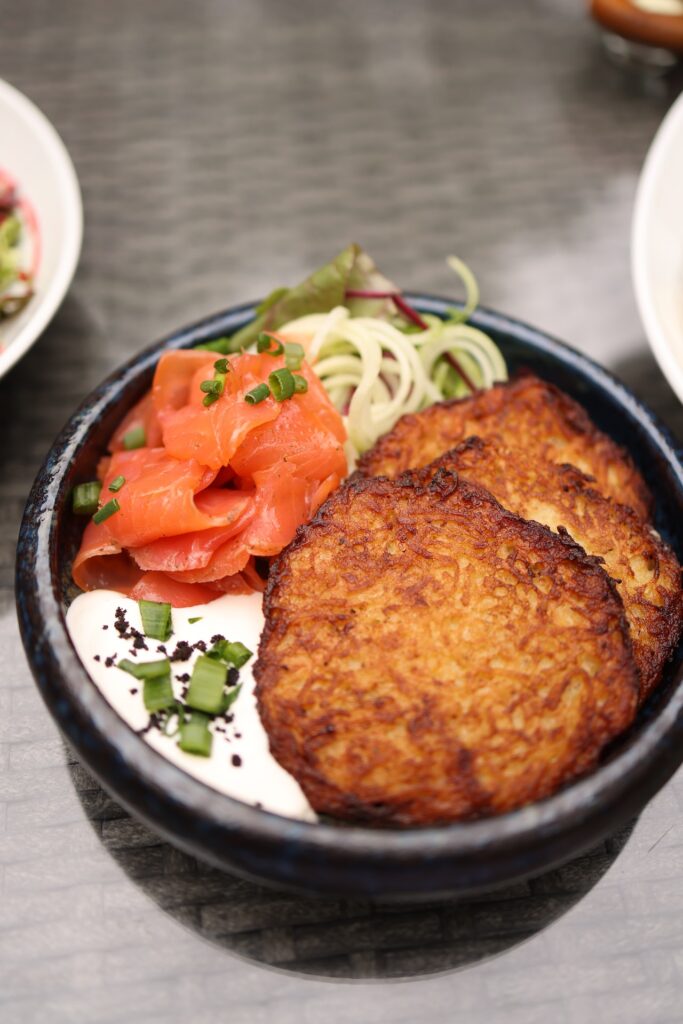
Fatty fish like salmon, mackerel, sardines, trout, herring, and tuna are excellent foods for glowing skin. That’s because they are rich sources of omega-3 fatty acids. Omega-3s provide powerful anti-inflammatory effects that can help reduce redness and acne. They also help strengthen the skin barrier, increase skin elasticity, and hydrate the skin by trapping moisture.
Aim to eat fatty fish at least twice a week to reap the benefits. Grilling, baking, or poaching the fish are healthy cooking methods. Topping your fish with anti-inflammatory ingredients like garlic, lemon juice, onions, tomatoes, olives, and spices can provide an extra nourishing skin boost.
Ways to eat more:
- Bake or grill salmon fillets and add to salads or bowls
- Flake into omelets, frittatas, and stir fries
- Make salmon cakes with canned salmon and whole grain breadcrumbs
- Swap tuna salad for salmon salad in sandwiches
2. Avocados
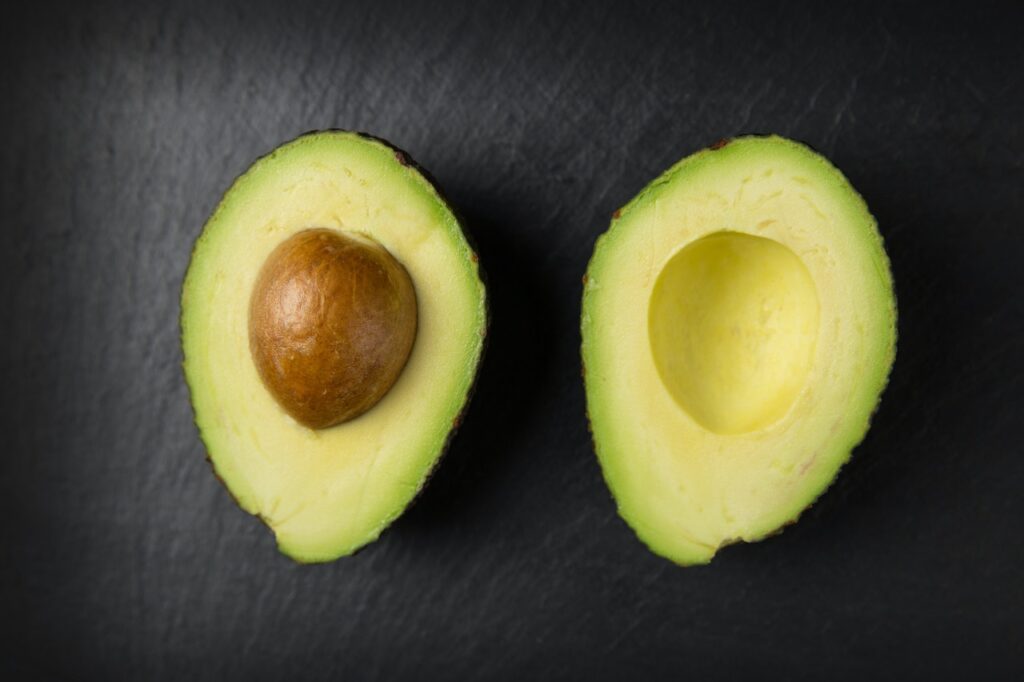
Avocados are revered for their amazing benefits for skin health. They are loaded with healthy monounsaturated fats that hydrate the skin and enhance collagen production. Avocados also contain vitamin E, an antioxidant that protects the skin from sun damage and free radicals. Vitamin E may even reduce wrinkles and support wound healing.
The carotenoids in avocados, including lutein and zeaxanthin, accumulate in the skin and shield it from blue light. This protects the skin from visible light that can generate free radicals. Enjoy avocado toast, guacamole, slices in salads, or a hass avocado all on its own to nourish your skin from the inside.
Ways to eat more:
- Add avocado slices to sandwiches, burgers, eggs, or salads
- Make homemade guacamole for dipping veggie sticks or spreading on whole grain toast
- Blend into smoothies for a creamy, vitamin-packed drink
3. Walnuts
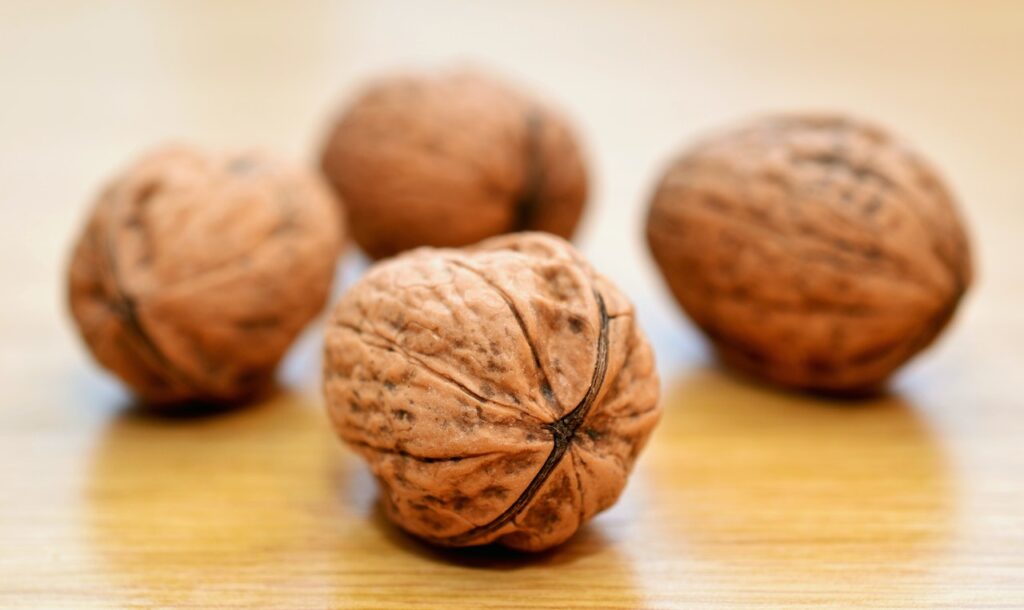
Walnuts are one of the best plant-based sources of omega-3 fatty acids, which makes them terrific for glowing skin. In addition to hydrating and reducing inflammation, walnuts contain other antioxidants like vitamin E and selenium. The copper in walnuts boosts collagen production for firmness and elasticity.
Snack on a handful of walnuts, add them to oatmeal or yogurt, use them in salads, or blend them into smoothies. Be sure to store walnuts properly in an airtight container in the fridge or freezer to prevent them from going rancid.
Ways to eat more:
- Sprinkle walnuts onto oatmeal, yogurt, and salads
- Process walnuts into homemade pesto or salad dressings
- Snack on a handful of walnuts with fruit
- Try walnut butter as an alternative to peanut or almond butters
4. Sunflower Seeds

Sunflower seeds are packed with nutrients that promote gorgeous, youthful skin in various ways. They are an excellent source of vitamin E and selenium, two antioxidants that guard against damaging free radicals from the sun and environment. The copper in sunflower seeds stimulates collagen and elastin synthesis to keep skin firm and flexible.
Sunflower seeds also contain linoleic acid, an anti-inflammatory omega-6 fatty acid that helps strengthen the skin barrier. The vitamin B-6 in sunflower seeds reduces redness and irritation. Enjoy sunflower seeds as a snack, sprinkled onto salads, blended into energy bites, or added to trail mixes.
5. Tomatoes
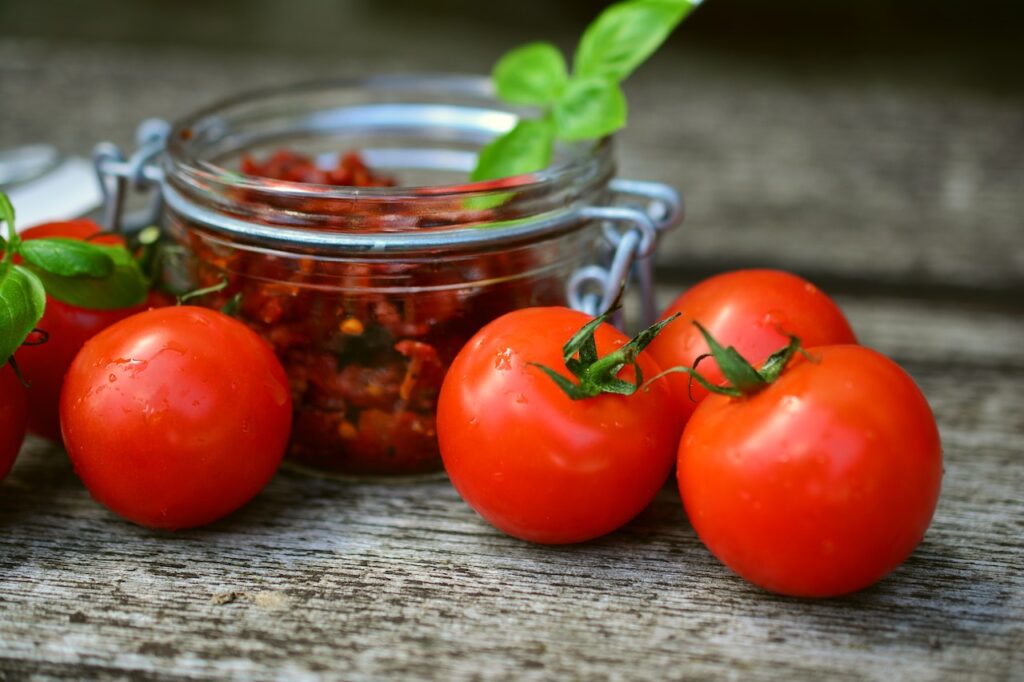
Juicy red tomatoes are brimming with goodness for radiant skin. They are an outstanding source of lycopene, a carotenoid antioxidant that shields skin from UV damage. In fact, research shows that eating tomato paste with olive oil for 12 weeks minimizes sunburn. Tomatoes also contain vitamin C, which assists collagen production and may protect against UV damage as well.
Tomatoes are rich in water content, providing hydration for plump, glowing skin. For optimal lycopene absorption, eat tomatoes with a source of fat like cheese, olive oil, or avocado. Enjoy tomatoes in salads, sauces, salsa, or roasted with olive oil. Cherry tomatoes make a convenient snack on the go.
Ways to eat more:
- Toss cherry tomatoes into salads, pastas, and grain bowls
- Make your own tomato sauce or salsa to ladle over lean proteins
- Drink low-sodium tomato juice or gazpacho soup for more lycopene
- Roast tomatoes and blend into hummus or sandwich spreads
6. Green Tea
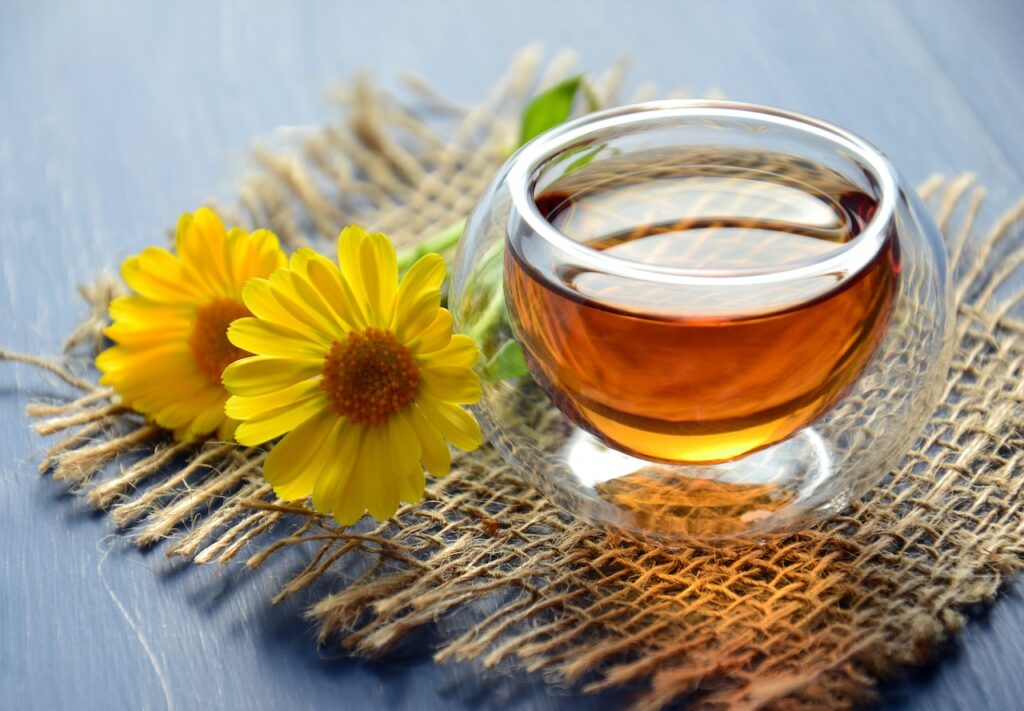
Sipping on green tea can help you achieve a glowing complexion. Green tea is chock-full of antioxidants, especially epigallocatechin gallate (EGCG). This potent compound fights inflammation, protects skin against UV radiation, and may prevent collagen breakdown.
The catechins in green tea may also regulate oil production in the skin, preventing acne. Drinking 2-3 cups of green tea per day is ideal for reaping the benefits. Opt for freshly brewed green tea whenever possible and add lemon for an extra boost of skin-loving vitamin C.
Ways to drink more:
- Brew hot or iced green tea alone or with fresh herbs like mint
- Add matcha green tea powder to smoothies, oatmeal, and yogurt
- Look for green tea extracts in moisturizers, cleansers, and face masks
- Swap sugary sodas and juices for unsweetened green tea
7. Dark Chocolate
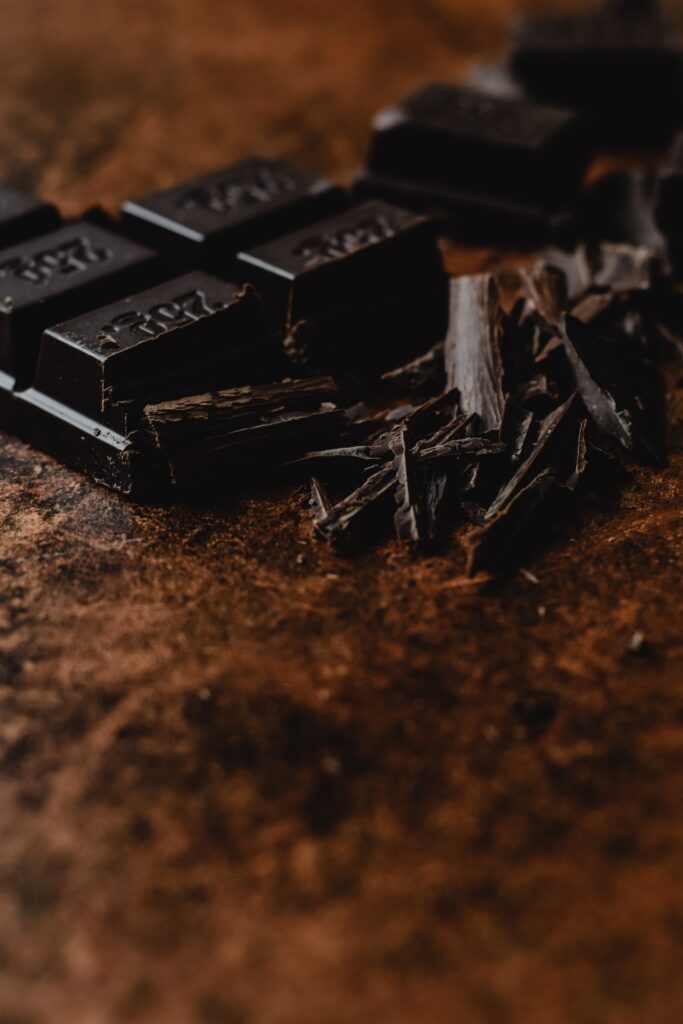
Indulging in moderate amounts of high-quality dark chocolate does your skin good. Dark chocolate with a cocoa content of at least 70% contains flavonoids with strong antioxidant and anti-inflammatory effects. The flavonoids may protect against sun damage, improve blood flow to the skin, increase hydration, and strengthen the skin barrier.
Dark chocolate also contains iron, which carries oxygen to the skin for a radiant glow. Stick to a 1-2 ounce serving of dark chocolate with at least 70% cocoa a couple times per week. Pair it with berries for added skin-nourishing benefits.
8. Sweet Potatoes
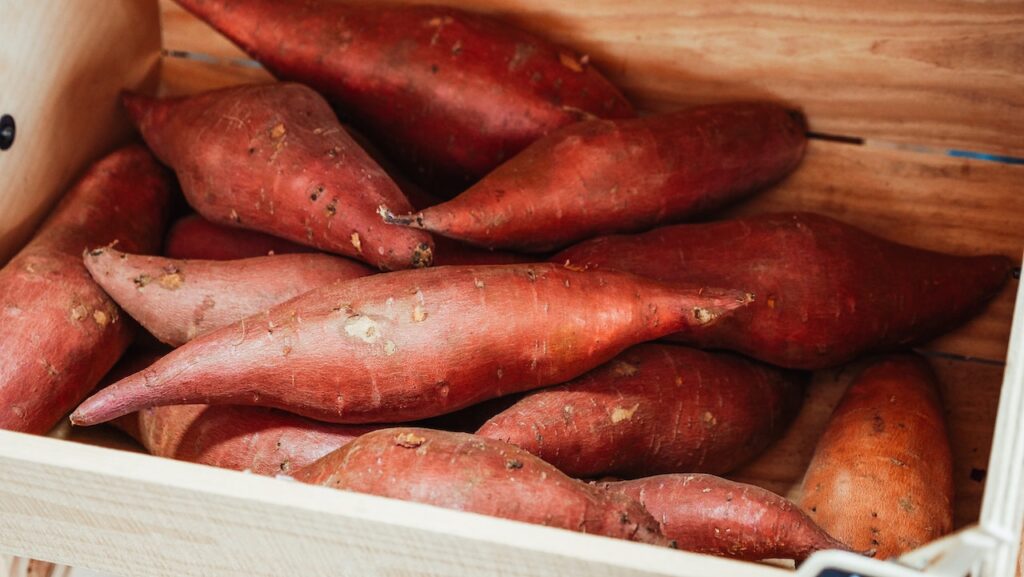
Orange-hued sweet potatoes are brimming with beta-carotene, an antioxidant that converts to vitamin A in your body. Vitamin A strengthens your skin’s protective tissue, keeps skin smooth, and improves overall tone. Beta-carotene specifically helps reduce skin dryness and signs of aging like fine lines and wrinkles.
Sweet potatoes also contain vitamin C, an essential nutrient for collagen production. Collagen provides structure to your skin, helping it stay firm and supple. The vitamin C in sweet potatoes acts as an antioxidant, protecting your skin from environmental damage.
Ways to eat more:
- Roast cubed sweet potatoes as a simple side dish
- Mash with low-fat milk, cinnamon, and nutmeg for a filling breakfast
- Shred raw into salads for an extra serving of vitamins
- Bake sweet potato fries or tots for a healthier snack swap
9. Leafy Greens
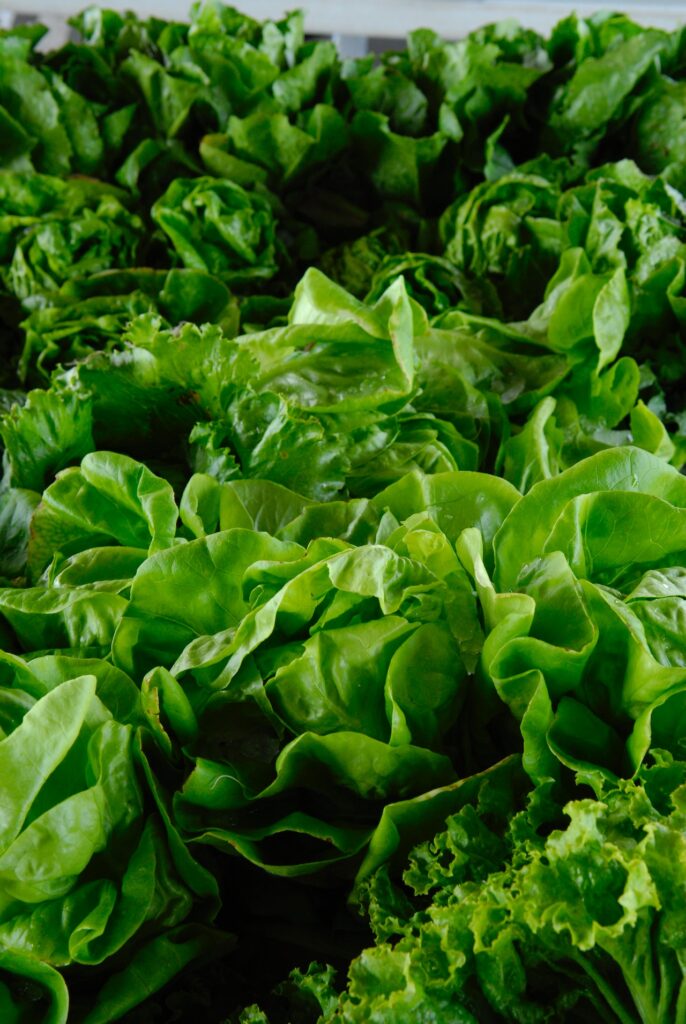
Leafy green vegetables like spinach, kale, and swiss chard are nutrition all-stars when it comes to skin health. They’re loaded with carotenoids like lutein and zeaxanthin that accumulate in your skin and protect against sun damage. Leafy greens also provide vitamin C and vitamin E – antioxidants that neutralize skin-damaging free radicals.
Additionally, leafy greens contain vitamin K which helps with blood clotting. This can minimize discoloration under eyes from broken capillaries and spider veins. The folate in leafy greens may also protect skin cells against DNA damage from UV radiation.
Ways to eat more:
- Add spinach, kale, arugula, or romaine to smoothies
- Sauté swiss chard, bok choy, or beet greens as a side dish
- Toss baby kale or spinach into pastas, soups, and stews
- Make big leafy green salads with avocado and lean protein
Tips for Glowing Skin

In addition to eating nutrient-dense foods for glowing skin, here are some other tips for achieving a radiant complexion:
- Stay hydrated – Drink plenty of water and aim for at least 8 glasses per day. Proper hydration plumps up the skin and delivers key nutrients.
- Exfoliate – Exfoliate 2-3 times per week to remove dead skin cells. Use a gentle scrub with ingredients like oats, sugar, or fruit enzymes.
- Protect from the sun – Wear SPF 30 or higher every day and limit direct sun exposure to prevent premature aging and sun spots.
- Manage stress – Chronic stress can make skin more prone to inflammation and sensitivity. Practice self-care through yoga, meditation, journaling, or other relaxing rituals.
- Get enough sleep – Strive for 7-9 hours of quality sleep per night so your skin has time to repair and restore itself. Lack of sleep can lead to dullness and dark under eye circles.
- Eat the rainbow – Aim to “eat the rainbow” by consuming a wide variety of vibrant fruits and veggies. Variety ensures you get diverse antioxidants for the best skin benefits.
The Importance of Diet for Skin Health
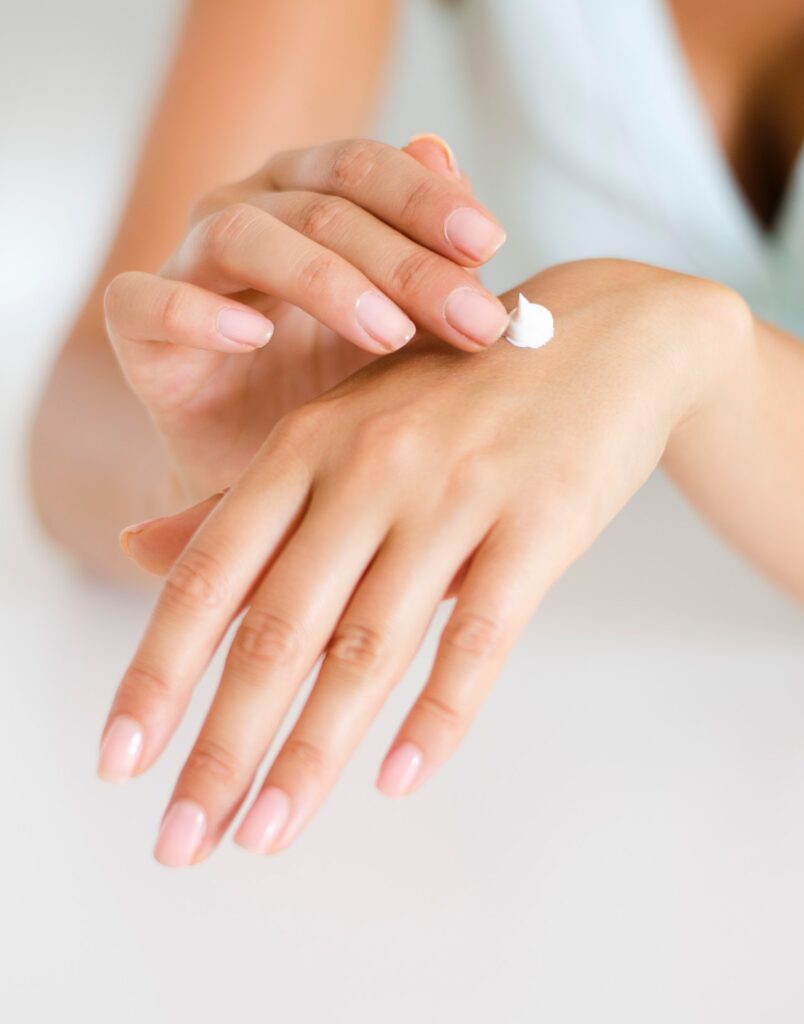
Your diet directly correlates to the health and appearance of your skin. As an organ, the skin requires proper nutrition to build strong structural components and look its best. Here’s an overview of why your diet matters so much for skin:
- Antioxidants – Foods containing antioxidants counteract oxidative damage from things like sunlight, pollution, and cigarette smoke that can degrade collagen and elastin over time.
- Anti-inflammatory compounds – Certain dietary components like omega-3 fatty acids and polyphenols reduce inflammatory pathways that can worsen acne, psoriasis, eczema, and premature aging.
- Micronutrients – Vitamins and minerals like vitamins A, C, and E, zinc, selenium, and silica provide structural support through collagen production, tissue repair, and enzymatic reactions.
- Hydration – Proper hydration is crucial for plump, supple skin with a radiant glow. Drinking adequate water ensures delivery of nutrients to skin cells.
- Healthy fats – Monounsaturated and polyunsaturated fats from foods like olive oil, fatty fish, and avocados hydrate the skin, reinforce the moisture barrier, and promote elasticity.
- Phytochemicals – Plant compounds like lycopene and polyphenols protect skin from UV radiation, boost collagen synthesis, decrease inflammation, and enhance skin cell renewal.
Making nutrition a priority is one of the most vital things you can do to achieve youthful, vibrant skin as you age. Supporting your skin through a diet rich in various fruits, vegetables, healthy fats, proteins, and antioxidants will help you glow!
Foods to Avoid for Skin Health
Just as specific foods can nourish your skin, other foods may contribute to skin issues like acne, inflammation, sensitivity, and premature aging when consumed in excess. Here are some foods it’s best to limit for optimal skin health:
- Refined sugars – Foods high in added sugars spike blood sugar and can worsen acne. They also promote glycation, which can accelerate wrinkles and sagging.
- Refined grains – Like added sugars, refined grains such as white bread and white pasta digest quickly and adversely affect blood sugar. They often contain few nutrients to support skin health.
- Fried foods – Foods fried in vegetable oils like potato chips, french fries, and donuts promote inflammation. Frying also generates free radicals that harm collagen.
- Processed meats – Deli meats, hot dogs, bacon, and sausage contain nitrates that can generate free radicals and inflammation. Too much red meat is similarly problematic.
- Excess alcohol – Drinking too much alcohol causes dehydration and inflammation. It can impair nutrient absorption, disturb sleep, and destroy collagen.
- Salt – A high sodium diet causes fluid retention and puffiness. It may worsen skin conditions like eczema. Limit salty foods and salt added in cooking.
Being mindful of limiting these foods while focusing on skin-nourishing foods can keep your complexion clear and youthful!
Foods for Specific Skin Needs
While certain foods promote general skin health across the board, tailoring your diet to obtain key nutrients can also help target specific skin concerns like acne, dullness, and aging.
Foods for Acne-Prone Skin
Certain dietary choices may worsen breakouts and inflammation. To help clear up acne-prone skin, emphasize foods rich in:
- Zinc – oysters, cashews, beef, egg yolks, yogurt, oats
- Omega-3s – salmon, walnuts, flaxseeds, chia seeds
- Antioxidants – green tea, berries, leafy greens
- Probiotics – yogurt, kefir, miso, kimchi
Minimize refined carbs and sugar that spike blood glucose, along with fried foods and unhealthy fats. Stay hydrated and consume anti-inflammatory foods.
Foods for Dull Skin
Lackluster skin can benefit from foods high in nutrients like:
- Vitamin C – red bell peppers, oranges, kiwis, broccoli, strawberries
- Beta carotene – sweet potatoes, carrots, spinach, cantaloupe
- Vitamin E – almonds, sunflower seeds, avocado
- Protein – salmon, eggs, yogurt, beans, lentils, quinoa
Focus on antioxidants, healthy fats like olive oil, and hydration through water and fruits and vegetables with high water content.
Foods for Aging Skin
Preventing and smoothing signs of aging like wrinkles requires special nutrients like:
- Collagen-boosting vitamin C – citrus fruits, strawberries, red/yellow peppers, kiwi
- Essential fatty acids – salmon, walnuts, flaxseed
- Antioxidants – pomegranates, blueberries, raspberries, pecans
- Vitamins A, C, E – carrots, broccoli, butternut squash, spinach, tomatoes
Avoid refined sugar, limit alcohol consumption, stay hydrated, and reduce inflammation through spices like turmeric.
Tailoring your diet to target your specific skin concerns can help you achieve clear, glowing, youthful skin!
Sample Meal Plan for Beautiful Skin
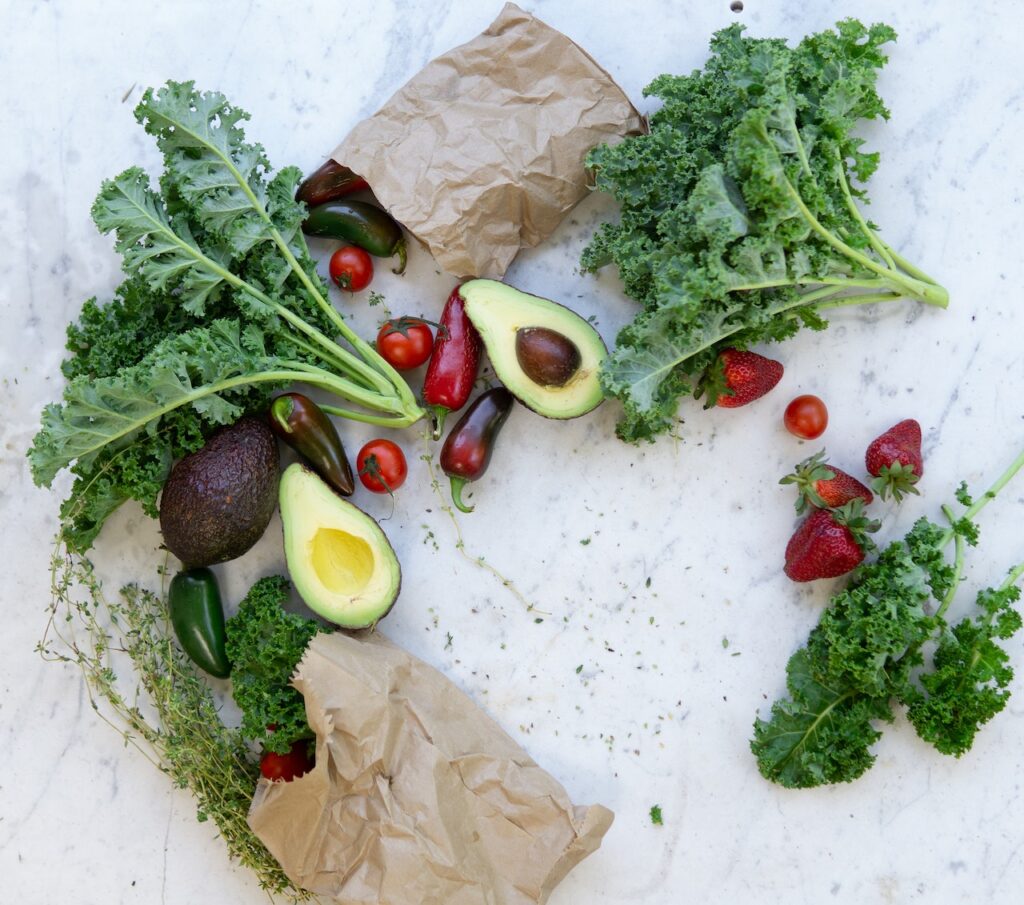
Eating a skin-nourishing diet doesn’t need to be complicated. Here is a simple 1 week meal plan focused on foods that promote gorgeous, youthful skin:
Monday
Breakfast: Avocado toast – mashed avocado, 2 slices whole grain toast, 2 poached eggs
Lunch: Tuna salad wrap – tuna with olive oil, diced cucumbers, Greek yogurt, greens in a whole wheat tortilla
Dinner: Salmon with sunflower seed crust, roasted asparagus and broccoli
Dessert: Mixed berries with whipped cream
Tuesday
Breakfast: Overnight oats – oats, chia seeds, yogurt, blueberries, sliced almonds
Lunch: Taco salad – ground turkey, greens, black beans, tomatoes, avocado, salsa
Dinner: Chicken thighs with pesto sauce, quinoa, roasted carrots
Dessert: Cherry tomatoes with hummus
Wednesday
Breakfast: Veggie omelet – eggs, spinach, tomatoes, onions
Lunch: Chopped salad – romaine, diced chicken, bell peppers, chickpeas, avocado, olive oil vinaigrette
Dinner: Lentil stew, whole grain bread, mixed greens salad
Dessert: Frozen yogurt with berries and dark chocolate shavings
Thursday
Breakfast: Green smoothie – spinach, mango, banana, yogurt, chia seeds
Lunch: Grilled chicken sandwich on whole wheat with lettuce, tomato, avocado
Dinner: Broiled salmon, wild rice pilaf, steamed broccoli
Dessert: Trail mix – nuts, seeds, dried fruit
Friday
Breakfast: Frittata – eggs, peppers, onions, cheese
Lunch: Turkey burger on whole wheat bun, roasted sweet potato fries
Dinner: Fish tacos – baked cod, corn tortillas, cabbage slaw, salsa
Dessert: Banana nice cream – frozen banana blended with cocoa powder
Saturday
Breakfast: Smoked salmon and avocado toast
Lunch: Quinoa tabbouleh salad with chickpeas, tomatoes, parsley, olive oil
Dinner: Veggie and black bean enchiladas, cilantro rice
Dessert: Dark chocolate covered strawberries
Sunday
Breakfast: Veggie scramble – eggs, kale, zucchini, mushrooms
Lunch: Mediterranean salad – greens, roasted vegetables, chickpeas, olive oil, grilled chicken
Dinner: Thai coconut curry with tofu and veggies over brown rice
Dessert: Berries with vanilla kefir
Glow-Boosting Recipes
Here are some delicious recipes incorporating skin-nourishing superfoods to try:
Green Glow Smoothie
- 1 cup baby spinach
- 1 cup coconut water
- 1/2 avocado
- 1/2 banana
- 1 cup pineapple chunks
- 1 tbsp chia seeds
- 1 tbsp honey
- Ice cubes
Blend all ingredients until smooth. The spinach, avocado, pineapple, and chia seeds provide antioxidants for skin protection, hydration, and anti-inflammation.
Salmon and Avocado Bowl
- 5 oz grilled salmon
- 1⁄2 avocado, sliced
- 1 cup quinoa
- 1 cup steamed broccoli
- Lemon wedges
- Everything bagel seasoning
Top quinoa and broccoli with salmon and avocado. Squeeze lemon juice and sprinkle on seasoning. The healthy fats help nourish skin and reduce inflammation.
Blueberry Coconut Oatmeal
- 1⁄2 cup oats
- 1⁄2 cup coconut milk
- 1⁄2 cup fresh blueberries
- 1 tsp chia seeds
- 1 tsp honey
- Cinnamon
Cook oats in coconut milk. Stir in blueberries, chia seeds, honey, and cinnamon. The antioxidants repair skin damage while coconut milk hydrates.
Tips for Youthful Skin from the Inside Out
Achieving glowing, youthful skin goes beyond just diet. Here are some holistic lifestyle tips for radiant skin:
- Manage stress through yoga, meditation, massage, nature walks, journaling, therapy, or other mindfulness practices. Chronic stress negatively impacts skin and health.
- Get 7-9 hours of sleep nightly so your skin has time to rejuvenate itself. Lack of sleep accelerates visible aging.
- Exercise regularly as it improves circulation and lymphatic drainage for clearer skin. Aim for 150 minutes per week.
- Don’t smoke as it depletes collagen, speeds aging, and decreases blood flow to the skin.
- Limit alcohol intake to special occasions since alcohol dehydrates the skin and impairs nutrient absorption.
- Cleanse gently using lukewarm water and mild, non-abrasive cleansers without fragrance. Over-cleansing strips the skin.
- Use SPF 30+ daily to protect against UV damage that ages the skin. Reapply every 2 hours if outdoors.
Caring for your skin inside and out is the most effective approach for maintaining a clear, youthful complexion as you age. Healthy skin stems from overall wellbeing!
Glowing Skin Supplements
Some of the top supplements for glowing skin work synergistically with a diet rich in skin-healthy foods:
Marine Collagen – Supports skin hydration, elasticity, smoothness, and wound healing by boosting dermal collagen. Look for collagen peptides for high bioavailability.
Hyaluronic Acid – Draws moisture into the skin, plumping up skin cells and smoothing fine lines and wrinkles. Helpful for dry, dehydrated skin.
Vitamin C – Boosts collagen synthesis and guards against UV damage as a potent antioxidant. Use an esterified form like magnesium ascorbyl phosphate for stability.
Retinol – Derived from vitamin A, retinol promotes faster cell turnover and exfoliates dead skin cells. Start with low doses and slowly increase.
Astaxanthin – A carotenoid antioxidant that improves skin moisture retention and elasticity while protecting against photo-aging. Has natural UV-blocking abilities.
Resveratrol – Potent polyphenol antioxidant found in red grapes, berries, and red wine that shields skin from oxidative stress and inflammation.
Probiotics – Beneficial bacteria like lactobacillus and bifidobacterium help strengthen skin’s barrier, improve immunity against pathogens, and reduce inflammation.
The Bottom Line
Diet has a profound impact on the health and appearance of your skin. Incorporating foods with certain vitamins, minerals, antioxidants, essential fatty acids, and anti-inflammatory compounds can help you achieve glowing, youthful skin. Salmon, avocados, walnuts, sunflower seeds, tomatoes, green tea, and dark chocolate are especially beneficial. Avoid refined carbs/sugars, fried foods, excess salt, and alcohol. Stay hydrated, manage stress, get enough sleep, wear SPF, and exercise too. With consistent skin-nourishing habits, your complexion can stay radiant and young well into your later years.
More Articles
- Finally, Quick Daily Exercises to Lose Belly Fat in a Month
- The 5 Best Exercises for Weight Loss
- Top 10 Tips for Getting Healthy in 2023
- Inspirational Quotes for Daily Motivation
FAQs about Diet and Skin
Why does diet affect skin health?
Your skin relies on certain vitamins, minerals, antioxidants, healthy fats, and water from your diet to build collagen and elastin, retain moisture, ward off damage, and remain youthful. Nutrient deficiencies lead to dull, prematurely aged skin.
How long until you see results in your skin from dietary changes?
It takes time to reap the benefits in your skin from nutritional improvements, but you should notice enhanced glow and clarity within a month or two. Be consistent with a healthy diet.
What foods cause acne?
Foods high in refined sugars and carbs like cookies, sugary cereals, white bread, and chips can worsen acne by spiking blood sugar. Dairy and whey protein may also exacerbate acne in some people. Fried foods and excess oil, chocolate, and soda are other culprits.
What vitamins are good for your skin?
Vitamins A, C, E, and B-complex provide excellent skin benefits:
Vitamin A promotes collagen growth and repairs skin cell damage. Food sources include carrots, sweet potatoes, and spinach.
Vitamin C is essential for forming collagen and acts as an antioxidant. Get it from citrus, peppers, broccoli, berries.
Vitamin E also protects skin from free radical damage as an antioxidant. Find it in plant oils, nuts and seeds.
B vitamins like riboflavin and niacin support skin cell turnover and regeneration. Yogurt and eggs supply B vitamins.
How can I make my skin glow overnight?
Some tips to make your skin look radiant by morning include:
Eat a skin-healthy dinner with antioxidant-rich veggies, proteins, and healthy fats
Apply a gentle overnight mask with hydrating and brightening ingredients
Get enough sleep (at least 7 hours) to let your skin fully renew itself
Drink a glass of water before bed to hydrate skin from the inside out
Sleep on a silk pillowcase to prevent irritation and creases
Avoid alcohol before bed as it dehydrates skin
What foods cause premature aging?
Diets high in sugar, refined carbs, trans fats, and processed foods lacking in antioxidants and phytonutrients can accelerate aging. Too much alcohol and inadequate protein, vitamin C, and essential fatty acids also degrade collagen.
Limit these aging foods and emphasize produce, lean proteins, nuts/seeds, and healthy fats to support youthful skin!
What vitamins are best for your skin?
Vitamin C, vitamin E, vitamin A (retinol), and vitamin B3 (niacin) offer the biggest skin benefits. Vitamin C is crucial for collagen production and skin immunity. Vitamin E protects cell membranes from free radical damage. Vitamin A strengthens the dermis layer and boosts cell turnover. Vitamin B3 improves skin elasticity and hydration.
What foods cause acne?
High glycemic foods like white bread, sugary snacks, and processed oils can trigger breakouts by spiking blood sugar and inflammation. Avoiding dairy, gluten, and excess caffeine may also help acne-prone skin for some people. Focus on anti-inflammatory foods rich in antioxidants.
What fruit is best for your skin?
Citrus fruits like oranges, grapefruit, and kiwi are excellent for skin thanks to their high vitamin C content. Papaya contains vitamin C and the enzyme papain that exfoliates dead skin cells. Blueberries, raspberries, and strawberries provide vitamin C plus antioxidants like anthocyanins. Tomato is technically a fruit that’s power-packed with the antioxidant lycopene.
What are the worst foods for your skin?
Foods high in sugar, refined carbohydrates, and unhealthy fats contribute to glycation – a process that damages skin proteins like collagen and elastin. Limit sugary drinks, candy, chips, processed meat, fried foods, and alcohol which dehydrate skin and deplete nutrients.
Images from – Pexels

